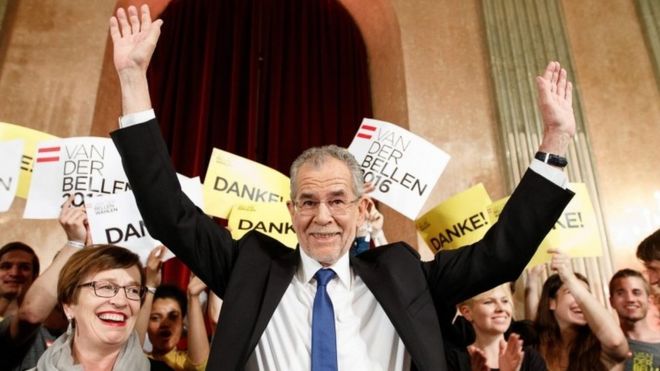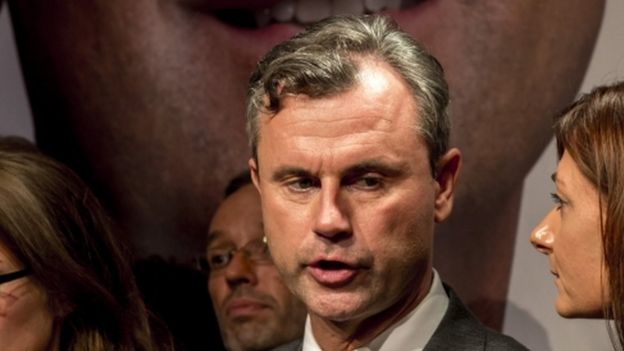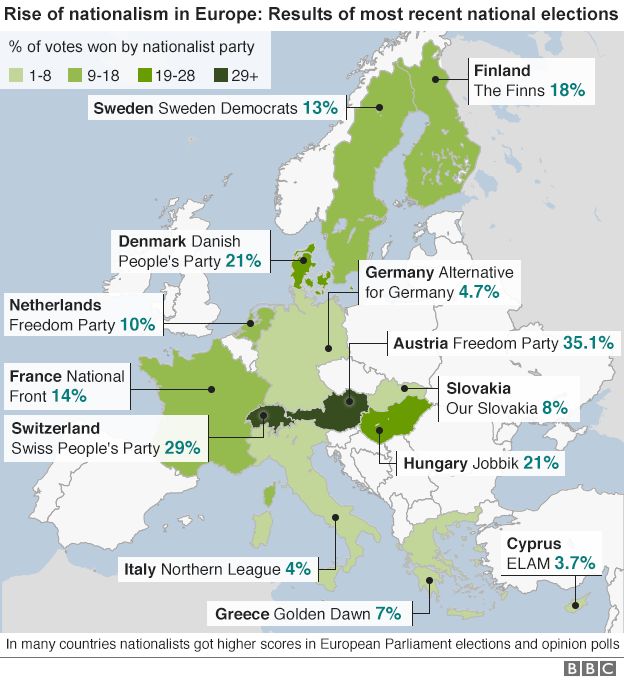
Mr Van der Bellen campaigned on a pro-EU platform, backed by the Greens Party
Alexander Van der Bellen has won Austria’s presidential election, preventing Norbert Hofer from becoming the EU’s first far-right head of state.
Mr Hofer led narrowly after Sunday’s election but postal votes gave Mr Van der Bellen victory by 50.3% to 49.7%.
Mr Van der Bellen campaigned on a pro-EU platform backed by the Greens Party.
Mr Hofer, of the Freedom Party, tapped into anti-EU sentiment and fears about rising numbers of asylum seekers. He conceded victory on his Facebook page.
Mr Hofer, 45, said it was a sad day and that he would have gladly served as president.
“But please don’t be disheartened. The effort in this election campaign is not wasted, but is an investment for the future.”
‘Relief’
Announcing the result, the interior ministry said Mr Van der Bellen had won 2,254,484 votes to Mr Hofer’s 2,223,458, a margin of 31,026 ballots.
Mr Hofer had led Mr Van der Bellen by 51.9% to 48.1% after counting on Sunday. But the 750,000 postal votes – roughly 12% of Austria’s 6.4 million registered voters – swayed the result.

Mr Hofer had narrowly led after Sunday’s count
Although Mr Van der Bellen, 72, is officially independent, he led Austria’s Greens for a decade and some European Green politicians were hailing him as the world’s first elected Green head of state.
The campaign was fierce at times. Mr Van der Bellen said he did not want Austria to be led by a “populist right-wing, pan-Germanic fraternity member” and even urged voters “who don’t like me but perhaps like Hofer even less to vote for me”.
Mr Hofer had been photographed sporting the German colours of the nationalist Marko-Germania student fraternity, which stands for “the German cultural community” and bears the slogan “Honour, Freedom, Fatherland”.
At his swearing-in as Freedom Party candidate, Mr Hofer wore a cornflower in his lapel, which was a Nazi symbol in the 1930s.
French PM Manuel Valls said in a Twitter post: “It’s a relief to see the Austrians reject populism and extremism. Everyone in Europe must draw lessons from this.”
Is Europe lurching to the far right?
Europe’s nationalist surge, country by country
Alexander Van der Bellen

- Age: 72
- Background: Economics professor
- Politics: Former Green Party leader
- Campaign soundbite: “I’ve experienced how Austria rose from the ruins of World War Two, caused by the madness of nationalism”
What was the breakdown of the vote?
In nine out of Austria’s 10 main cities Mr Van der Bellen came top, whereas Mr Hofer dominated the rural areas, the Austrian broadcaster ORF reported (in German).
Support for Mr Hofer was exceptionally strong among manual workers – nearly 90%. The vote for Mr Van der Bellen was much stronger among people with a university degree or other higher education qualifications.
Support for Mr Hofer among men was 60%, while among women it was 60% for Mr Van der Bellen.
What powers does the Austrian president have?
It is mostly a ceremonial post. But the president does have the power to dissolve the National Council – the more powerful lower house of parliament. That triggers a general election. The president can only do that once for a particular reason – he cannot use the same grounds to dissolve it again.
It is the chancellor’s job to appoint government ministers. And the chancellor has the power to dismiss the government. But ministers have to be formally sworn in by the president. And Mr Hofer has said he would not swear in a female minister who wore a hijab, which he has described as a sign of oppression.

BBC
 Q FM Africa's Modern Radio
Q FM Africa's Modern Radio